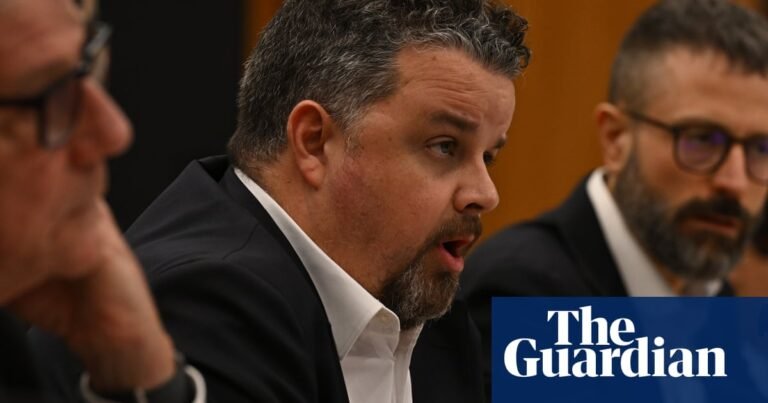The New South Wales premier characterised a caravan found laden with explosives as a terrorism event because that was the briefing provided by police, his chief of staff has told an inquiry, despite the police telling the public at the same time there were “alternative lines” of inquiry.
On Friday, five staffers from the offices of the NSW premier, Chris Minns, and the police minister, Yasmin Catley, appeared before the inquiry after they were threatened with arrest for failing to attend last week.
The inquiry – launched with the support of the Coalition, the Greens and crossbench MLCs – is examining the handling of information about the caravan plot amid concerns parliament may have been “misled” before controversial laws aimed at curbing antisemitism were rushed through parliament.
After police announced in January that a caravan had been found laden with explosives at a residential property in Dural, in greater Sydney, Minns said it had the potential to be a “mass casualty event”, and that “there is only one way of calling it out, and that is terrorism”. But in March, the Australian federal police revealed they believed it was a “con job” by organised crime figures seeking to divert police resources and influence prosecutions.
Minns’ chief of staff, James Cullen, appeared alongside two of Minns’ deputy chiefs of staff, Edward Ovadia and Sarah Michael. The police minister’s chief of staff, Ross Neilson, and deputy chief of staff, Tilly South, also appeared.
But it was mainly Cullen who came under intense questioning by the committee.
Cullen told the hearing that the premier characterised the incident as a terrorist attack during a press conference on 29 January, shortly after the incident was leaked to the media, because that was “the language and the briefing the police provided the premier”. He said the same was true for Minns labelling it a “potentially mass casualty event”.
“The language ‘potential mass casualty event’, was not a line dreamed up by the premier. It was in briefings from New South Wales police provided to the government, provided to the premier,” he said.
Cullen then reminded the inquiry that the deputy police commissioner, David Hudson, had made it clear during the same press conference, and also during an appearance on 2GB the following day, that there were alternative lines of inquiry.
Independent MP and chair of the inquiry, Rod Roberts, responded to this by asking why the premier did not tell the public there were other possibilities, saying: “Now I watched that news, and I believed what the premier told me. I believed it right. He says there’s no alternative to terrorism at that stage.”
He also pointed out that neither Hudson, nor the then police commissioner Karen Webb used the word terrorism when describing the event.
Cullen asserted the premier’s comments were “based on the latest advice from police, and which was… there was a [joint counter-terrorism team] investigation looking at a potential mass casualty event, and there was lines of inquiry in relation to that”.
“I just think there’s a very convenient rewriting of history here and squashing of time and of concepts.”
Cullen did not directly answer multiple follow-up questions about what the premier was briefed in regards to alternative lines of investigation, saying it involves a “delicate investigation”.
“Put it this way, there were … alternative lines of investigation that were clearly being explored, early on, and really didn’t, for want of a better term, get shaken out until the 21st of February,” he said.
skip past newsletter promotion
Sign up to Breaking News Australia
Get the most important news as it breaks
Privacy Notice: Newsletters may contain info about charities, online ads, and content funded by outside parties. For more information see our Privacy Policy. We use Google reCaptcha to protect our website and the Google Privacy Policy and Terms of Service apply.
after newsletter promotion
The inquiry heard in earlier evidence during a hearing in May that the briefings between police and cabinet ministers about the incident was “pens down”. Cullen, after questioning from Nationals MP Wes Fang, said he wouldn’t characterise it as such and that no one instructed for it to be so.
Fang later asked how a meeting where the premier was being briefed “on a potential terrorism episode” in which his office did not keep notes was responsive to the State Records Act.
Cullen asserted that Minns’ office didn’t breach the act because it wasn’t a decision-making meeting.
Following questions by Labor MP Bob Nanva, Cullen agreed it would have been “irresponsible” to not treat the caravan incident as a “potentially mass casualty” event given that it was being investigated by the joint counter-terrorism investigation.
Cullen told the hearing that the legislation aimed at curbing antisemitism – which was passed on 21 February, the day police said they ruled out the Dural caravan as a terrorism event although they had not yet made this public – did not relate to the alleged terrorism event.
“There were a lot of things going on for an extended period of time. I mean, these conversations didn’t start on the 19th of January, the 20th of January or the 29th of January,” he told the hearing.
Cullen was also grilled by Greens MP Sue Higginson on whether the premier had instructed the five staffers to not attend the inquiry.
Last Tuesday, days before the staffers did not appear and were then threatened with arrest, Minns told 2GB “we’ve had extensive discussions with them about it, but I don’t want them to”.
Cullen said: “There was absolutely no formal [or] informal direction from the premier. I must be really clear about that.”
